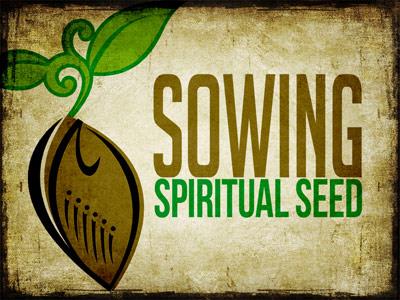-
"Wonder”
Contributed by Dr. Jerry Morrissey on Nov 28, 2017 (message contributor)
Summary: July 28, 2002 -- TENTH SUNDAY AFTER PENTECOST -- Proper 12 1 Kings 3:5-12 Psalm 119:129-136 When your word goes forth, it gives light and understanding. (Ps. 119:130) Romans 8:26-39 Matthew 13:31-33, 44-52 Color: Green Title: “Wonder”
July 28, 2002 -- TENTH SUNDAY AFTER PENTECOST -- Proper 12
1 Kings 3:5-12
Psalm 119:129-136
When your word goes forth, it gives light and understanding. (Ps. 119:130)
Romans 8:26-39
Matthew 13:31-33, 44-52
Color: Green
Title: “Wonder”
31 He put before them another parable: "The kingdom of heaven is like a mustard seed that someone took and sowed in his field; 32it is the smallest of all the seeds, but when it has grown it is the greatest of shrubs and becomes a tree, so that the birds of the air come and make nests in its branches."
The Parable of the Yeast
33 He told them another parable: "The kingdom of heaven is like yeast that a woman took and mixed in with three measures of flour until all of it was leavened."
Three Parables
44 "The kingdom of heaven is like treasure hidden in a field, which someone found and hid; then in his joy he goes and sells all that he has and buys that field.
45 "Again, the kingdom of heaven is like a merchant in search of fine pearls; 46on finding one pearl of great value, he went and sold all that he had and bought it.
47 "Again, the kingdom of heaven is like a net that was thrown into the sea and caught fish of every kind; 48when it was full, they drew it ashore, sat down, and put the good into baskets but threw out the bad. 49So it will be at the end of the age. The angels will come out and separate the evil from the righteous 50and throw them into the furnace of fire, where there will be weeping and gnashing of teeth.
Treasures New and Old
51 "Have you understood all this?" They answered, "Yes." 52And he said to them, "Therefore every scribe who has been trained for the kingdom of heaven is like the master of a household who brings out of his treasure what is new and what is old." 53When Jesus had finished these parables, he left that place.
The discourse, a collection of parables, comes to an end with three little parables each starting with “the kingdom of heaven is like…”
The first two parables in the last three, the treasure and the pearl, probably circulated as a pair. They stress the supreme value of the kingdom Jesus inaugurates. The third parable, the final one in this discourse encompassing chapter thirteen, stresses the finality of the separation between good and evil which will take place at the end of this “age.” All three parables are found only in this gospel.
The twin parables of the treasure and the pearl two Old Testament symbols for wisdom, differ from the other parables in this chapter in that they are addressed to and are concerned with the individual person rather than the group. The parable of the dragnet (vv. 47-48) has an interpretative explanation (vv. 49-50)attached to it and is a repetition of vv. 40-42, the interpretative explanation of the parables of the wheat and weeds.
Verses 31-33: Parables are frequently twinned or paired in the Synoptics. The first two make the same point: small beginnings yield great results. The first, that of the mustard seed, would appeal to men, while the second, that of the leaven, would appeal more to women. Subtly, Matthew, Luke not so subtly, overcomes his Jewish propensity to rate men above women or even to exclude them from mention. The message of Jesus was just too inclusive. However, compare Mark 10: 2-12 to Matthew 19: 3-12. The idea that a husband can commit adultery against his wife, found in Mark, is omitted in Matthew.
v. 31 like a mustard seed: The disproportionate magnitude between the beginning seed and the final plant or tree highlights yet another feature of the kingdom of God and heaven. The mustard seed was proverbial for its smallness, though not, in fact, the smallest of all seeds. Yet it grew to become larger than any of the other garden plants to the size of a veritable tree some eight to ten feet high. Its size attracted the wild birds, which would come and eat the black seeds of the “tree.” The point, of course, is that the kingdom may start out small but that it will grow to enormous size. Taking the long view, the eternal perspective, Jesus counsels his followers, a tiny minority at this stage, not to be intimidated by the size of the opposition or any other obstacles.
Verse 33 is like leaven: Leaven is a fermenting agent, like yeast, added to a batch of dough and causing it to rise and expand. Usually leaven is used as a metaphor for evil, seen as having a corrupting influence by virtue of its gradual permeation of the mass of dough. Here, it has a positive meaning for the very same reason, its permeating and penetrating quality. Normally a small piece of dough kept from a previous baking would be allowed to ferment and placed in the new batch, causing the dough to rise over a period of time. Bread could be made from yeast or leaven, but the continuing use of leaven from batch to batch increased the chances of disease, infection or corruption over time. Thus, once a year all leaven was to be destroyed (Ex12: 14-15) for hygienic as well as religious purposes, and the Feast of Unleavened Bread marked a new beginning.

 Sermon Central
Sermon Central



